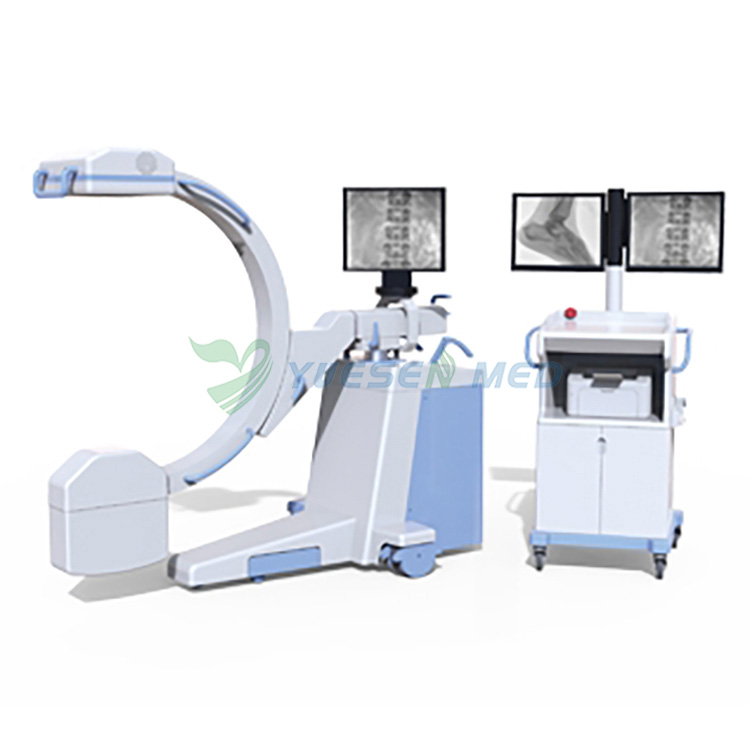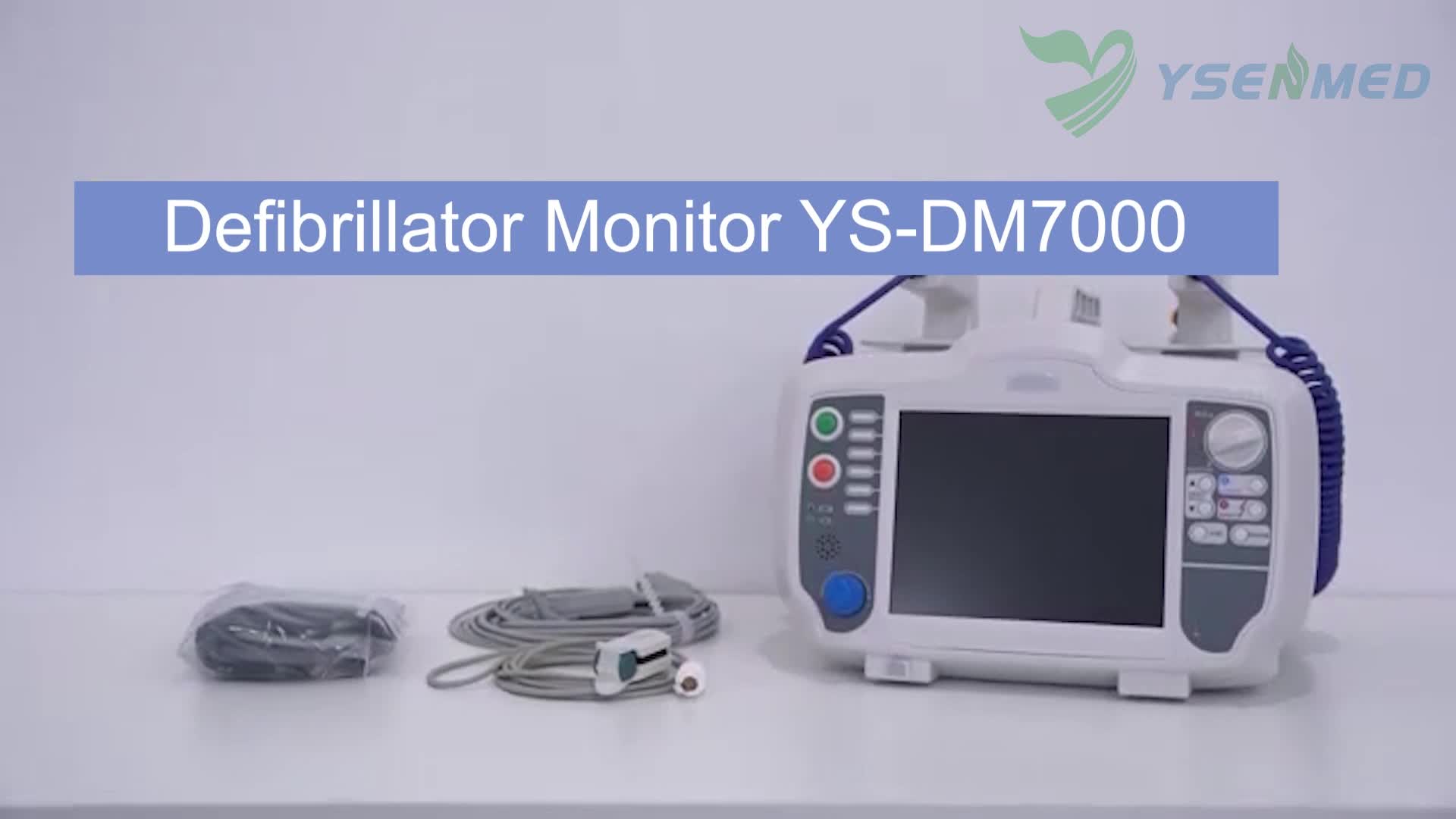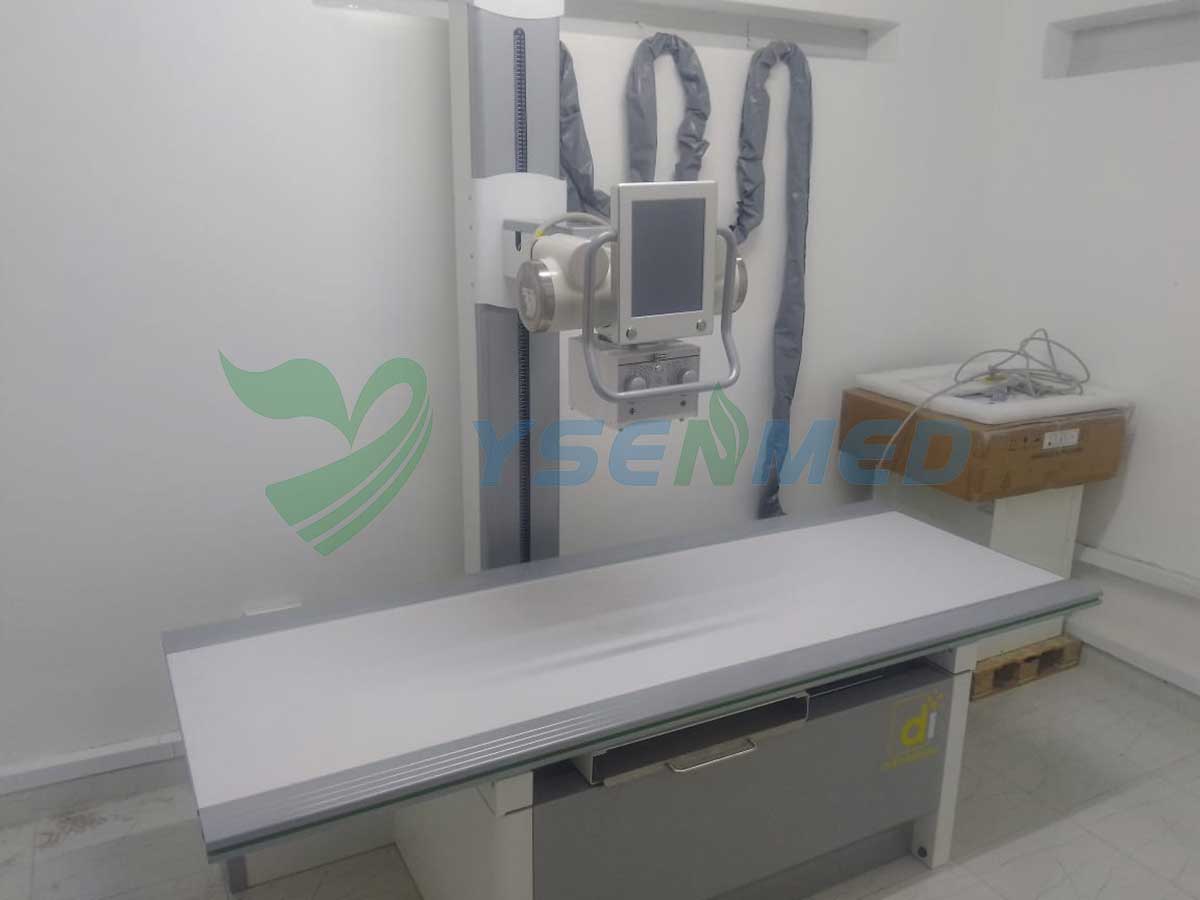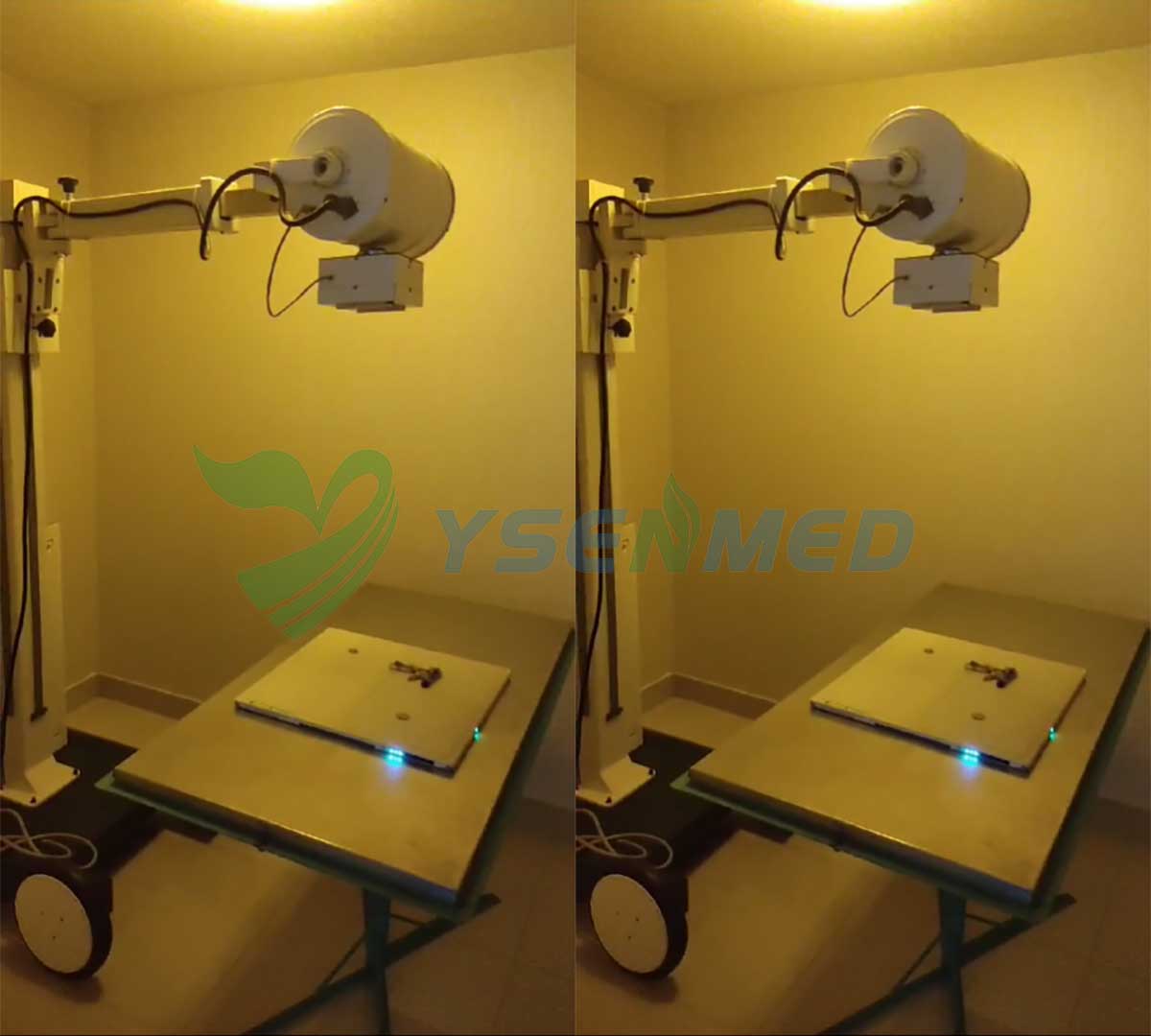Hot Products
YSX500D 50kW DR system set up and put into service in Cambodia.
YSENMED YSX500D 50kW digital x-ray system has been successfully set up and put into service in a hospital in Cambodia.
YSX056-PE serving as a vehicle-mounted x-ray in the Philippines
YSX056-PE 5.6kW portable x-ray unit has been adapted to fit on a truck, to provide mobile x-ray examination service for remote communities in the Philippines.
X Ray Machine To Zimbabwe
x ray machine, 50KW x ray machine
Microscope To Malawi
Achromatic objectives: 4X、10X、40X(S), 100X(S、Oil) Wide field eyepiece: WF10X(WF16X for option) Eyepiece head: Sliding binocular head inclined at 45° Stage: Double layer mechanical stage size 140X140mm, moving range 75X45mm Focusing: Coaxial coarse and
From Surgery to Diagnosis: The Versatility of Medical Digital High-Frequency C-arm X-ray Machines
Views : 1734
Update time : 2024-08-31 14:53:00
In the world of modern medicine, technology plays a pivotal role in ensuring accurate diagnoses and successful treatments. One such technological marvel is the digital high-frequency C-arm X-ray machine. This versatile device has revolutionized the way medical professionals conduct surgeries and diagnose conditions. But what exactly makes it so special? Let's dive into the fascinating world of C-arm machines and explore their multifaceted applications.

What is a C-arm X-ray Machine?
To kick things off, let's clarify what a C-arm X-ray machine is. Imagine a large, mobile X-ray device shaped like the letter "C." This machine is designed to provide real-time imaging during surgical procedures, allowing doctors to see what's happening inside the body without making large incisions. It's a game-changer for both diagnosis and treatment!
The Evolution of C-arm Technology
From Traditional to Digital
C-arm machines have come a long way since their inception. Early models were bulky and offered limited imaging capabilities. However, with the advent of digital technology, today's C-arms are lighter, more efficient, and provide high-resolution images. This evolution has made them indispensable in various medical fields.
High-Frequency Innovations
The term "high-frequency" refers to the machine's ability to produce X-rays at higher frequencies, resulting in better image quality and reduced radiation exposure for patients. This is a significant leap forward in patient safety and diagnostic accuracy.
Key Features of Digital High-Frequency C-arm Machines
1. Real-Time Imaging
One of the standout features of C-arm machines is their ability to provide real-time imaging. This capability allows surgeons to make immediate decisions during procedures, enhancing both safety and efficacy.
2. Portability
Unlike traditional X-ray machines, C-arms are mobile. This portability means they can be easily moved between operating rooms, making them ideal for various surgical environments.
3. High-Resolution Imaging
The digital technology used in modern C-arms offers high-resolution images that are crucial for accurate diagnoses. This clarity helps doctors identify issues that might be missed with lower-quality imaging.
4. User-Friendly Interface
Most digital C-arms come equipped with intuitive interfaces that simplify operation. This ease of use means that even less experienced staff can operate the machine effectively, reducing the learning curve.
Applications in Surgery
Orthopedic Surgery
In orthopedic procedures, C-arms are invaluable. Surgeons use them to visualize bone structures and alignments during operations, ensuring that implants are placed correctly. Imagine trying to fit a puzzle piece in the dark—C-arms light up the picture!
Cardiovascular Procedures
C-arms are also extensively used in cardiovascular surgeries. They allow for detailed imaging of blood vessels and the heart, helping surgeons navigate complex procedures with precision.
Neurosurgery
In neurosurgery, where every millimeter counts, the real-time imaging provided by C-arms is crucial. They help neurosurgeons visualize brain structures, ensuring that delicate maneuvers are performed safely.
Diagnostic Applications
Gastroenterology
In gastroenterology, C-arms assist in diagnosing conditions like gastrointestinal bleeding. They provide detailed images of the digestive tract, helping doctors pinpoint issues without invasive procedures.
Urology
Urologists also benefit from C-arm technology, using it to visualize the urinary tract and kidneys. This aids in diagnosing conditions like kidney stones and tumors.
Pain Management
C-arms are increasingly utilized in pain management procedures. They help guide injections and other treatments directly to the source of pain, maximizing effectiveness.
Advantages of Using C-arm Machines
Enhanced Patient Safety
With reduced radiation exposure and real-time imaging, C-arms significantly enhance patient safety during procedures. This is a win-win for both doctors and patients!
Improved Surgical Outcomes
The precision offered by C-arms leads to improved surgical outcomes. When surgeons can see exactly what they're doing, the likelihood of complications decreases.
Cost-Effective
While the initial investment in a C-arm machine can be substantial, the long-term benefits often outweigh the costs. Fewer complications and shorter recovery times lead to lower overall healthcare expenses.
Challenges and Considerations
Training and Expertise
Despite their user-friendly nature, operating a C-arm effectively requires training. Medical professionals must be well-versed in the machine's functionalities to maximize its potential.
Maintenance and Upkeep
Like any advanced technology, C-arms require regular maintenance to ensure optimal performance. Hospitals must invest in keeping these machines in top shape.
The Future of C-arm Technology
Integration with AI
As technology continues to evolve, the integration of artificial intelligence (AI) into C-arm machines is on the horizon. AI could enhance image analysis, providing even more accurate diagnoses.
Telemedicine Applications
With the rise of telemedicine, C-arms could play a crucial role in remote consultations. Imagine a surgeon in one location guiding a procedure in another, all while receiving real-time images from a C-arm!
Conclusion
In summary, digital high-frequency C-arm X-ray machines are a cornerstone of modern medical practice. Their versatility spans from surgery to diagnosis, making them invaluable tools in various medical fields. As technology continues to advance, we can expect even more innovative applications for C-arms, further enhancing patient care and outcomes. So, the next time you hear about a C-arm, remember—it's not just a machine; it's a vital partner in the journey of healing!
FAQ
What is a C-arm X-ray machine used for?
A C-arm X-ray machine is primarily used for real-time imaging during surgical procedures. It helps surgeons visualize the internal structures of a patient’s body, allowing them to make informed decisions while performing operations. Additionally, C-arms are utilized in diagnostic imaging for various medical specialties, including orthopedics, cardiology, and gastroenterology.
How does a digital high-frequency C-arm differ from traditional X-ray machines?
Digital high-frequency C-arms differ from traditional X-ray machines in several ways. They produce higher-quality images with less radiation exposure, thanks to advanced digital technology. Additionally, C-arms are mobile and can be easily maneuvered during surgeries, providing real-time imaging, which is not typically available with stationary traditional X-ray machines.
Are there any risks associated with using a C-arm X-ray machine?
While C-arm machines are generally safe, there are some risks associated with radiation exposure, both for patients and medical staff. However, modern C-arms are designed to minimize radiation doses while still providing high-quality images. Medical professionals are trained to use protective measures, such as lead aprons, to further reduce exposure during procedures.
How long does it take to operate a C-arm during a procedure?
The time it takes to operate a C-arm during a procedure can vary depending on the complexity of the surgery and the specific imaging needed. Typically, the imaging process is quick, often taking just a few seconds to capture the necessary views. However, the overall time spent using the C-arm may extend depending on the surgeon's requirements throughout the operation.
What training is required to operate a C-arm X-ray machine?
Operating a C-arm X-ray machine requires specialized training for medical professionals. This training typically includes understanding the machine's functions, safety protocols, and how to position patients correctly for optimal imaging. Many hospitals provide in-house training or send staff to specialized courses to ensure they are proficient in using the equipment safely and effectively.

What is a C-arm X-ray Machine?
To kick things off, let's clarify what a C-arm X-ray machine is. Imagine a large, mobile X-ray device shaped like the letter "C." This machine is designed to provide real-time imaging during surgical procedures, allowing doctors to see what's happening inside the body without making large incisions. It's a game-changer for both diagnosis and treatment!
The Evolution of C-arm Technology
From Traditional to Digital
C-arm machines have come a long way since their inception. Early models were bulky and offered limited imaging capabilities. However, with the advent of digital technology, today's C-arms are lighter, more efficient, and provide high-resolution images. This evolution has made them indispensable in various medical fields.
High-Frequency Innovations
The term "high-frequency" refers to the machine's ability to produce X-rays at higher frequencies, resulting in better image quality and reduced radiation exposure for patients. This is a significant leap forward in patient safety and diagnostic accuracy.
Key Features of Digital High-Frequency C-arm Machines
1. Real-Time Imaging
One of the standout features of C-arm machines is their ability to provide real-time imaging. This capability allows surgeons to make immediate decisions during procedures, enhancing both safety and efficacy.
2. Portability
Unlike traditional X-ray machines, C-arms are mobile. This portability means they can be easily moved between operating rooms, making them ideal for various surgical environments.
3. High-Resolution Imaging
The digital technology used in modern C-arms offers high-resolution images that are crucial for accurate diagnoses. This clarity helps doctors identify issues that might be missed with lower-quality imaging.
4. User-Friendly Interface
Most digital C-arms come equipped with intuitive interfaces that simplify operation. This ease of use means that even less experienced staff can operate the machine effectively, reducing the learning curve.
Applications in Surgery
Orthopedic Surgery
In orthopedic procedures, C-arms are invaluable. Surgeons use them to visualize bone structures and alignments during operations, ensuring that implants are placed correctly. Imagine trying to fit a puzzle piece in the dark—C-arms light up the picture!
Cardiovascular Procedures
C-arms are also extensively used in cardiovascular surgeries. They allow for detailed imaging of blood vessels and the heart, helping surgeons navigate complex procedures with precision.
Neurosurgery
In neurosurgery, where every millimeter counts, the real-time imaging provided by C-arms is crucial. They help neurosurgeons visualize brain structures, ensuring that delicate maneuvers are performed safely.
Diagnostic Applications
Gastroenterology
In gastroenterology, C-arms assist in diagnosing conditions like gastrointestinal bleeding. They provide detailed images of the digestive tract, helping doctors pinpoint issues without invasive procedures.
Urology
Urologists also benefit from C-arm technology, using it to visualize the urinary tract and kidneys. This aids in diagnosing conditions like kidney stones and tumors.
Pain Management
C-arms are increasingly utilized in pain management procedures. They help guide injections and other treatments directly to the source of pain, maximizing effectiveness.
Advantages of Using C-arm Machines
Enhanced Patient Safety
With reduced radiation exposure and real-time imaging, C-arms significantly enhance patient safety during procedures. This is a win-win for both doctors and patients!
Improved Surgical Outcomes
The precision offered by C-arms leads to improved surgical outcomes. When surgeons can see exactly what they're doing, the likelihood of complications decreases.
Cost-Effective
While the initial investment in a C-arm machine can be substantial, the long-term benefits often outweigh the costs. Fewer complications and shorter recovery times lead to lower overall healthcare expenses.
Challenges and Considerations
Training and Expertise
Despite their user-friendly nature, operating a C-arm effectively requires training. Medical professionals must be well-versed in the machine's functionalities to maximize its potential.
Maintenance and Upkeep
Like any advanced technology, C-arms require regular maintenance to ensure optimal performance. Hospitals must invest in keeping these machines in top shape.
The Future of C-arm Technology
Integration with AI
As technology continues to evolve, the integration of artificial intelligence (AI) into C-arm machines is on the horizon. AI could enhance image analysis, providing even more accurate diagnoses.
Telemedicine Applications
With the rise of telemedicine, C-arms could play a crucial role in remote consultations. Imagine a surgeon in one location guiding a procedure in another, all while receiving real-time images from a C-arm!
Conclusion
In summary, digital high-frequency C-arm X-ray machines are a cornerstone of modern medical practice. Their versatility spans from surgery to diagnosis, making them invaluable tools in various medical fields. As technology continues to advance, we can expect even more innovative applications for C-arms, further enhancing patient care and outcomes. So, the next time you hear about a C-arm, remember—it's not just a machine; it's a vital partner in the journey of healing!
FAQ
What is a C-arm X-ray machine used for?
A C-arm X-ray machine is primarily used for real-time imaging during surgical procedures. It helps surgeons visualize the internal structures of a patient’s body, allowing them to make informed decisions while performing operations. Additionally, C-arms are utilized in diagnostic imaging for various medical specialties, including orthopedics, cardiology, and gastroenterology.
How does a digital high-frequency C-arm differ from traditional X-ray machines?
Digital high-frequency C-arms differ from traditional X-ray machines in several ways. They produce higher-quality images with less radiation exposure, thanks to advanced digital technology. Additionally, C-arms are mobile and can be easily maneuvered during surgeries, providing real-time imaging, which is not typically available with stationary traditional X-ray machines.
Are there any risks associated with using a C-arm X-ray machine?
While C-arm machines are generally safe, there are some risks associated with radiation exposure, both for patients and medical staff. However, modern C-arms are designed to minimize radiation doses while still providing high-quality images. Medical professionals are trained to use protective measures, such as lead aprons, to further reduce exposure during procedures.
How long does it take to operate a C-arm during a procedure?
The time it takes to operate a C-arm during a procedure can vary depending on the complexity of the surgery and the specific imaging needed. Typically, the imaging process is quick, often taking just a few seconds to capture the necessary views. However, the overall time spent using the C-arm may extend depending on the surgeon's requirements throughout the operation.
What training is required to operate a C-arm X-ray machine?
Operating a C-arm X-ray machine requires specialized training for medical professionals. This training typically includes understanding the machine's functions, safety protocols, and how to position patients correctly for optimal imaging. Many hospitals provide in-house training or send staff to specialized courses to ensure they are proficient in using the equipment safely and effectively.
Related News
Read More >>
 How Long Can a Baby Stay in an Incubator?
How Long Can a Baby Stay in an Incubator?
May .10.2025
How long can a baby stay in an incubator? Let’s dive into this topic, from the reasons for incubator use to what parents can expect during their little one's stay.
 Introduction video of YSENMED YS-DM7000 Defibrillator Monitor
Introduction video of YSENMED YS-DM7000 Defibrillator Monitor
May .02.2025
Here we share the introduction video of YSENMED YS-DM7000 Defibrillator Monitor.
 Kenyan distributor sets up YSX500D DR system and considers re-purchase.
Kenyan distributor sets up YSX500D DR system and considers re-purchase.
May .01.2025
Our Kenyan distributor has successfully set up the YSX500D 50kW digital x-ray system in a hospital, and considers purchasing another 32kW x-ray system.
 YSFPD-M1717V VET flat panel detector helps digitize the x-ray in a Peruvian vet clinic
YSFPD-M1717V VET flat panel detector helps digitize the x-ray in a Peruvian vet clinic
Apr .30.2025
With the professional after-sales assistance from YSENMED team, Peruvian vet has managed to upgrade his mobile analog x-ray system with YSFPD-M1717V VET wilress flat panel detector and the images come out clear and highly satisfactory.



